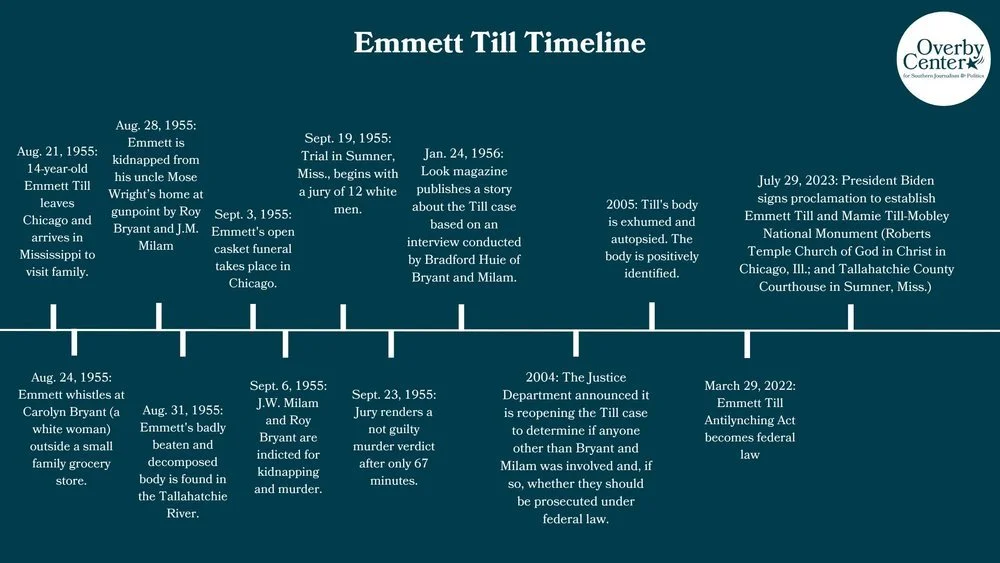Author Ron Collins on Till: Confront injustice by shining a light on it
By Emily O’Reilly and Ahmer Khan
The tragic events of the murder of Emmett Till in 1955 and the farcical trial that followed were discussed in a program at the Overby Center for Southern Journalism and Politics on Oct. 9. Author Ronald Collins discussed his new book, “Tragedy on Trial: The Story of the Infamous Emmett Till Murder Trial.”
Collins taught constitutional law at the University of Washington and is the author of 13 books. He served as a judicial fellow under United States Chief Justice Warren Burger and clerked for Justice Hans Linde on the Oregon Supreme Court. His work on free speech, civil rights, and constitutional law has appeared in leading academic journals and major national publications. He was a Thomas Grey Fellow at Stanford Law School. Later, he was a senior scholar at the Newseum’s First Amendment Center in Washington, D.C.
Otis Sanford, professor emeritus in journalism at the University of Memphis and a member of the Overby Center panel of experts, moderated the event.
Collins emphasized the importance of the symbolic speech of Mamie Till-Mobley in deciding to have an open-casket funeral for her son whose body had been mutilated beyond recognition. The case gained national attention because of her actions, Collins said.
"She said, 'I want the world to see what they've done to my boy,'" Collins said. "Tens of thousands of people, mostly African American, came to the funeral. The story went national, international. Can you imagine mothers bringing their children to look at that coffin, at an open-casket funeral?"
Till, a Black teen-ager from Chicago, was visiting relatives in Money, Miss., in the Mississippi Delta during the summer of 1955. After being accused of offending a white woman, he was abducted and murdered. Two local white men were indicted for the murder but were acquitted by an all-male, all-white jury. Numerous irregularities occurred during the investigation and the trial, and these are documented in Collins’ book. The two accused men, not fearing further prosecution after their acquittal because of the constitutional protection against double jeopardy, later sold their story admitting the murder to Look magazine. Till’s murder and the subsequent events would be a catalyst for the civil rights movement.
Timeline of Emmett Till's murder and the subsequent events. Timeline by the Overby Center.
Collins discussed various aspects of the investigation and the trial. He especially noted the ways in which H.C. Strider, sheriff of Tallahatchie County from 1951-1955, contributed to the outcome of the trial.
"He originally signed the death certificate, and when he signed it, it said Emmett Till, it said a Black boy," Collins said. "He ordered that Till be sent to a Black mortuary, that he'd be buried. But when he took the stand, he said, 'I can't say if this is Emmett Till or not.'"
Collins said that, at trial, Strider testified that he heard stories that Till was in another state and had been brought to Mississippi in order to create civil unrest. Collins said that when Strider claimed jurisdiction, any idea of justice was lost.
"That was just part of the evil that H.C. Strider did, but one of the worst things he did is he claimed jurisdiction," Collins said. "The murder didn't happen in his jurisdiction. He claimed jurisdiction and because of that, he was able to orchestrate this. Was the case that the prosecutors had to make a difficult one? Yes, but it became impossible."
Sanford wrote the critically acclaimed book, “From Boss Crump to King Willie: How Race Changed Memphis Politics,” and co-authored, “In a Colorful Place: Seasoned Opinion About Memphis, About Home, About Life.” Sanford formerly served as managing editor, editorial page editor and Viewpoint columnist for The Commercial Appeal in Memphis.
Sanford asked whether the Till case was, in fact, the beginning of the civil rights movement. “And I believe it was,” Sanford said. Collins agreed. “It cuts to the heart,” Collins said. “The savagery and the grace. And the courage (of Till’s mother). How many parents would want this displayed to the world?”
Collins advised the audience to shine a light on the past to confront injustices.
"The past does repeat itself and the challenge that we face as lawyers, as litigators, as judges, as reporters, as poets, as playwrights, as social activists is how do we confront that injustice," Collins said. "One of the ways we do it is by shining a light on the past. Sometimes it’s going to upset us. Sometimes it’s going to inspire us. But in the end, it will get us closer to the mark we call truth.”
-–––––––––––––––––––––––––––––––––––––––––––––––––––––––––––––––––––––––––––
Emily O’Reilly is a student assistant in the Overby Center. She is majoring in journalism with a minor in sociology and emphases in social justice and political reporting. Ahmer Khan is a graduate student assistant in the Overby Center. He is studying law and journalism.

